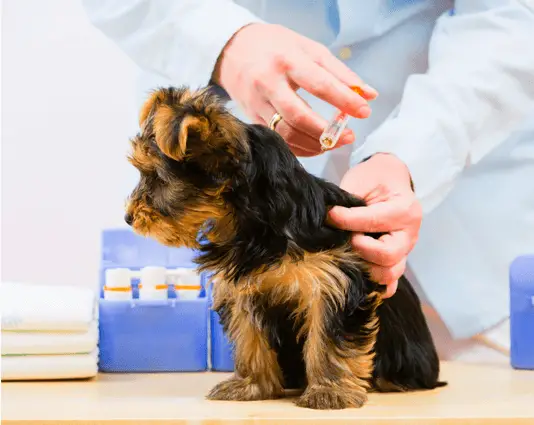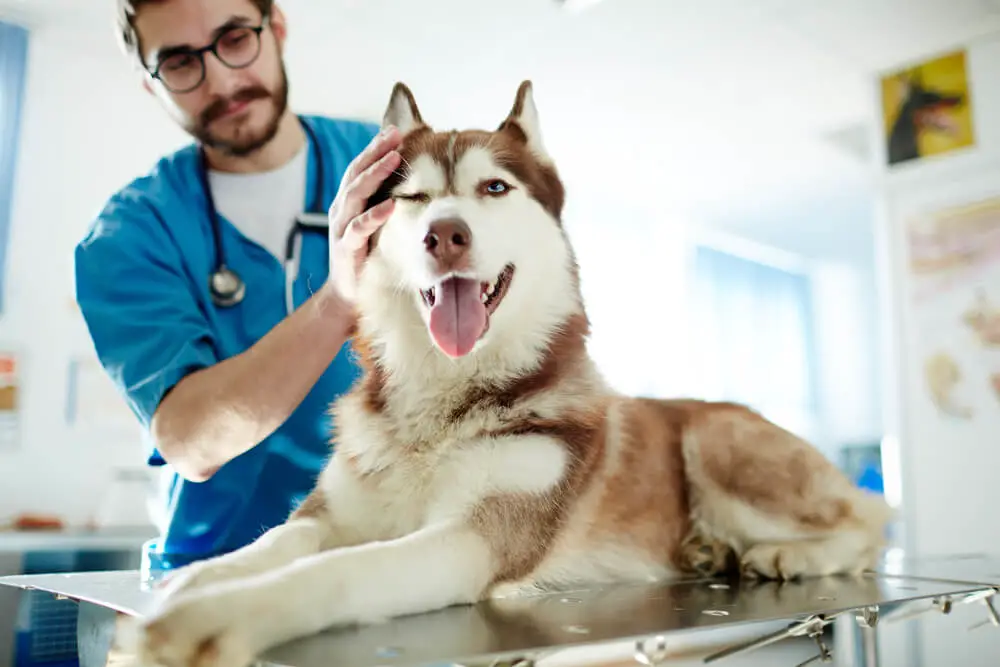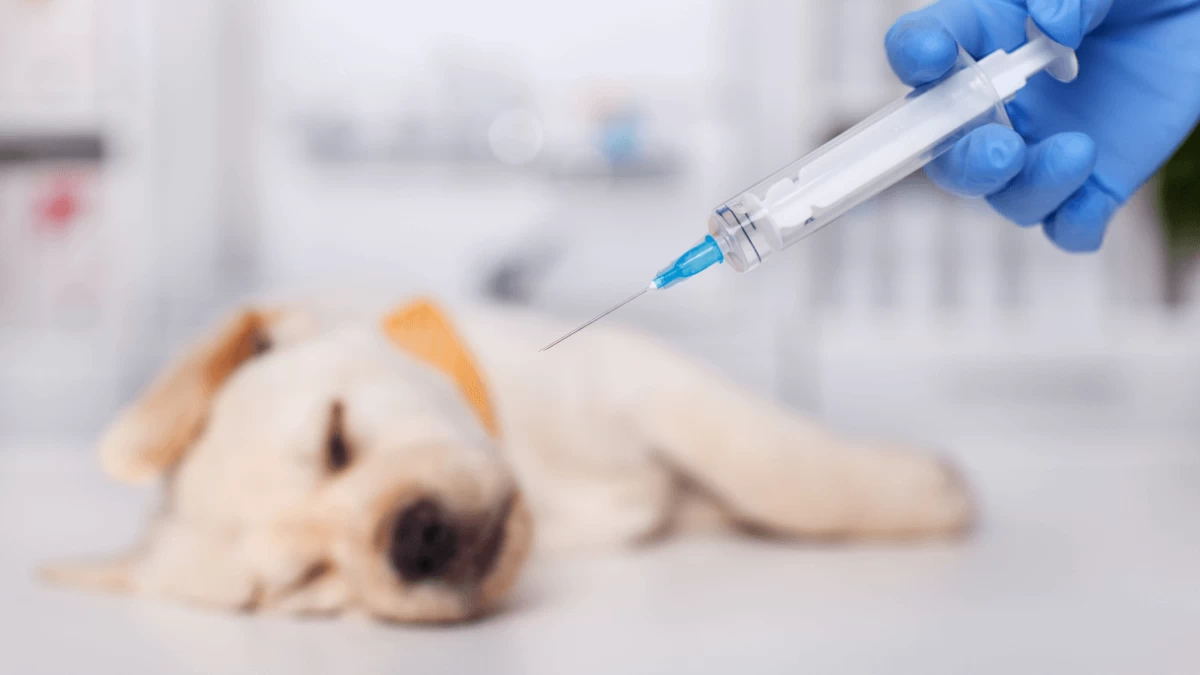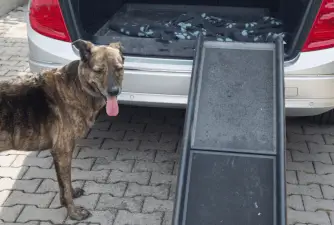Puppy Shot Schedule: All About Vaccines
16.01.2021.
From the first moment, your new puppy arrives at your home, you will know they are completely dependant on you. It is your job to keep them as healthy as possible, and getting all the puppy shots within the recommended schedule is the most important thing you should do. Other things will include getting them a healthy, balanced diet, plenty of toys, and enough daily activities so they don't get bored and destructive.
Many diseases can hurt our puppies, and the good news is - they are preventable. If you keep to the puppy shot schedule, there is no reason you should be scared of any of these diseases. There are many vaccinations with complicated names, so making sense of it all can seem difficult. To help new owners navigate the shot schedule, we made this easy-to-follow guide.
Recommended shot schedule
Sticking to the recommended vaccination schedule is the best way to protect your new puppy from problems that might occur. It would also be smart to pick a vet that has a good reputation. They will be your best ally throughout your dog's life. Here are the recommended schedule;
- 6 - 8 weeks - At six to eight weeks, the puppy will probably still be with their breeder. The breeder must get the first two recommended shots, and those are parvo and distemper shots. Every reputable breeder will get their puppies vaccinated.
- 10 - 12 weeks - At 10 or 12 weeks, there is a chance your new puppy will come to your home. It is up to you now to get them vaccinated, and at this time, most puppy shots should happen. Your puppy should get a DHPP shot (distemper, adenovirus, parvovirus, and parainfluenza).
- 16 - 18 weeks - These should be the follow-up vaccines. Your puppy should receive a DHPP and rabies shot that is required by law.
- 12 - 16 months - Your puppy is not a puppy anymore, and this is another round of boosters and follow-up shots. Again, the shot your dog should get is DHPP and rabies.
The law requires you to et your dog vaccinated for rabies every 1 - 3 years. It would be best to check your local and state laws, so you don't get into trouble and don't endanger your dog. The DHPP shots should be administered every 1.5 years.

Optional shot schedule
Unfortunately, these aren't all diseases that can harm your new pup. The good news again is that other diseases can be prevented as well. They are a lot less common, but your vet will let you know which optional shots might be good for your dog based on your lifestyle and environment. Here is the schedule of optional dog shots;
- 6 - 8 weeks - At six to eight weeks, the optional shot should be a Bordetella shot.
- 10 - 12 weeks - At 10 or 12 weeks, there are different options that your vet will recommend. Their recommendation will be based on your environment and lifestyle. Optional shots at this time are Influenza, Leptospirosis, Lyme disease, and Bordetella.
- 16 - 18 weeks - At 16 weeks, your puppy is eligible for Lyme disease, Leptospirosis, canine Corona, and Bordetella. Again, it will depend on the lifestyle and environment.
Every 1.5 years, when your puppy gets the recommended DHPP shots, your vet can tell you which optional shots might be good for your pup. The optional follow-up shots are for canine Coronavirus, Bordetella, Influenza, Leptospirosis, and Lyme disease.
What are the worst diseases that vaccinations prevent?
Vaccines helped our dogs live healthier and longer lives, and we can thank our vets and scientists for developing them. They have allowed us to spend more time with our dogs and eradicate certain diseases from ever harming or even killing our dogs. If you wondered which diseases they help fight, here are the worst of the worst.
Parvovirus
Every breeder's worst nightmare is the parvovirus. It is a very contagious virus that can kill a puppy within 72 hours after contracting it. This nasty virus affects the gastrointestinal tract and causes
- Vomiting
- Diarrhea
- Fever
- Loss of appetite
There is no cure for it, and puppies under four months are especially susceptible to it. The best thing you could do is get your puppy vaccinated.
You can read more about the canine parvovirus here.
Canine distemper
Before the distemper vaccine's invention, there were whole litters and kennels wiped out because of the distemper virus. Dogs aren't the only species affected by distemper; raccoons, skunks, foxes, and other animals can also get infected. This virus attacks the nervous, gastrointestinal, and respiratory systems and causes
- Seizures
- Vomiting
- Diarrhea
- Fever
- Eye and nose discharge
- Paralysis
- Twitching
- Death

Infected dogs can have a hard time fighting this virus, and there is no cure. Their body has to fight the infection on its own. The only thing you could do is control the symptoms and make sure your dog is hydrated and has enough energy to fight the virus.
Canine hepatitis
Canine hepatitis is a highly infectious disease that affects the dog's spleen, lungs, eyes, liver, and kidneys. This is not the same virus that affects humans. This is another virus that has no cure, and vets usually recommend treating the symptoms. Some symptoms of canine hepatitis are:
- Stomach enlargement
- Pain in the liver area
- Fever
- Congestion of mucous
- Jaundice
Rabies
Rabies is another nasty virus that affects the central nervous system. The most common way this virus gets transmitted is by the bite of an infected animal. This is a deadly disease that needs to be treated in a matter of hours upon infection. Luckily, it is preventable, and most countries require all dogs to be vaccinated against rabies. Some of the symptoms of rabies are:
- Hallucinations
- Excessive drooling
- Paralysis
- Anxiety
- Headache
- Fear of water
- Death
In short
Vaccinations are a great ally in a fight to keep your dog healthy. There is a lot of misinformation available online trying to disprove vaccinations' effectiveness, but talk to your vet, and they will tell you all you need to know. Vaccinations are a great way to make sure your puppy won't get affected by easily preventable diseases and will have a chance to develop into a happy and healthy dog.
World Dog Finder team








Share